Related Research Articles

The politics of Egypt are based on republicanism, with a semi-presidential system of government. The current political system was established following the 2013 Egyptian military coup d'état, and the takeover of President Abdel Fattah el-Sisi. In the current system, the President is elected for a six-year term. He can appoint up to 5 percent of the parliament. Furthermore, the President has the power to dissolve Parliament through Article 137. The Parliament of Egypt is the oldest legislative chamber in Africa and the Middle East. The unicameral Parliament has the ability to impeach the President through Article 161. With 2020 elections to the new Senate, the chamber became bicameral.

Boutros Boutros-Ghali was an Egyptian politician and diplomat who served as the sixth Secretary-General of the United Nations (UN) from 1992 to 1996. An academic who previously served as acting foreign minister and vice foreign minister of Egypt, Boutros-Ghali oversaw the UN over a period coinciding with several world crises, including the Breakup of Yugoslavia and the Rwandan genocide. He went on to serve as the first Secretary-General of La Francophonie from 1997 to 2002.

Kefaya is the unofficial moniker of the Egyptian Movement for Change, a grassroots coalition which prior to the 2011 revolution drew its support from across Egypt's political spectrum. It was a platform for protest against Hosni Mubarak's presidency and the possibility he might seek to transfer power directly to his son Gamal; political corruption and stagnation; "the blurring of the lines between power and wealth; and the regime's cruelty, coercion and disregard for human rights."
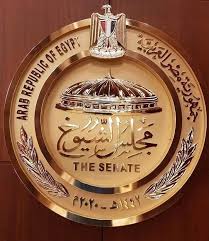
The Senate is the upper house of the bicameral Parliament of Egypt since its introduction in the 2019 Egyptian constitutional referendum and the subsequent 2020 Egyptian Senate election.
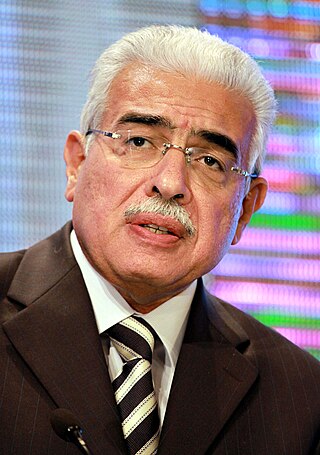
Parliamentary elections were held in Egypt in three-stage elections in November and December 2005 to elect 444 of the 454 members of the People's Assembly. The elections formed the Eighth Assembly since the adoption of the 1971 Constitution. Over 7,000 candidates competed in 222 constituencies for the Assembly's 444 elected seats.
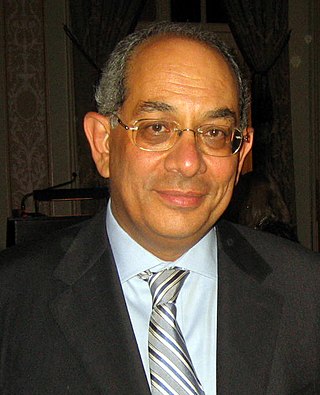
Youssef Raouf Boutros-Ghali or YBG is an Egyptian economist who served in the government of Egypt as Minister of Finance from 2004 to 2011. He was succeeded by Samir Radwan on 31 January 2011.
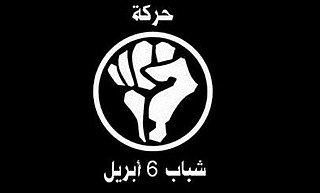
The April 6 Youth Movement is an Egyptian activist group established in Spring 2008 to support the workers in El-Mahalla El-Kubra, an industrial town, who were planning to strike on 6 April.

The 2011 Egyptian revolution, also known as the 25 January revolution, began on 25 January 2011 and spread across Egypt. The date was set by various youth groups to coincide with the annual Egyptian "Police holiday" as a statement against increasing police brutality during the last few years of Hosni Mubarak's presidency. It consisted of demonstrations, marches, occupations of plazas, non-violent civil resistance, acts of civil disobedience and strikes. Millions of protesters from a range of socio-economic and religious backgrounds demanded the overthrow of Egyptian President Hosni Mubarak. Violent clashes between security forces and protesters resulted in at least 846 people killed and over 6,000 injured. Protesters retaliated by burning over 90 police stations across the country.

There have been numerous domestic responses to the Egyptian revolution of 2011. Opposition parties, activists and religious bodies have been staunchly demanding Egyptian President Hosni Mubarak's resignation, with the exception of fearful Christian authorities, who called for staying away from the protests. The government has made ongoing attempts at media censorship, including briefly shutting down nearly all Internet traffic.

The Egyptian Crisis is a period that started with the Egyptian revolution of 2011 and ended with a new government under the presidency of Abdel Fattah el-Sisi in 2014. It was a tumultuous three years of political and social unrest, characterized by mass protests, a series of popular elections, deadly clashes, and military reinforcement. The events have had a lasting effect on the country's current course, its political system and its society.
The trials and judicial hearings following the 2011 Egyptian Revolution were a series of legal moves to establish accountability among the various Egyptian government officials and prominent businessmen.

Shura Council elections were held in Egypt between 29 January and 22 February 2012. The Freedom and Justice Party emerged as the largest party in the council, winning 105 of the 180 elected seats.

The following chronological summary of major events took place during the 2011 Egyptian revolution right up to Hosni Mubarak's resignation as the fourth President of Egypt on 11 February 2011.

Hossam El-Gheriany is an Egyptian judge. Winning recognition as a champion of judicial independence in the regime of President Mubarak, he became head of the Supreme Judicial Council and the Court of Cassation. Today he also heads the Constituent Assembly of Egypt and is president of the National Council for Human Rights.

Protests against the 2013 Egyptian coup d'état erupted in July 2013. Immediately following the removal of President Mohamed Morsi by the Egyptian Armed Forces on 3 July 2013 amid demonstrations against Morsi's rule, many protesters amassed near the Rabia Al-Adawiya Mosque to call for Morsi's return to power and condemn the military, while others demonstrated in support of the military and interim government. Deadly clashes such as Rabaa massacre continued for several days, with three particularly bloody incidents being described by officials as "massacres" perpetrated by security forces. During the month of Ramadan, prime minister Hazem al-Beblawy threatened to disperse the ongoing Pro-Morsi sit-ins in Rabaa al-Adaweya square and al-Nahda square. The government crackdown of these protests occurred in a violent dispersal on 14 August 2013. In mid-August, the violence directed by the army towards the protesters escalated, with hundreds killed, and the government declaring a month-long nighttime curfew.
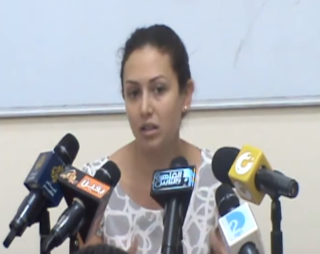
Yara Sallam is a prominent Egyptian feminist and human rights advocate. She has worked as a lawyer and researcher for several Egyptian and international human rights organizations, as well as for the African Commission on Human and Peoples’ Rights (ACHPR).
Copts in Egypt refers to Coptic people born in or residing in Egypt.
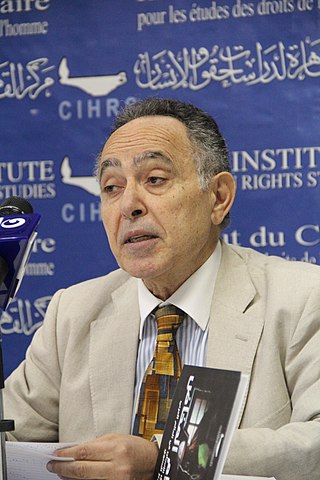
Bahey eldin Hassan is an Egyptian human rights defender and one of the founders of the Egyptian human rights movement in the 1980s. Hassan currently serves as the Director of the Cairo Institute for Human Rights Studies (CIHRS), which he cofounded in 1993. In 2014, and after receiving death threats for his human rights work, Hassan had to leave Egypt and currently lives in self-imposed exile in France. Hassan is also a journalist, lecturer, author and editor of several published articles, papers and books on human rights and democratic transformation in the Arab region.

Mohamed Fayek is an Egyptian politician who held various cabinet posts from 1967 to 1971 during the presidency of Gamal Abdel Nasser. He was the minister of national guidance in 1967, the minister of information between 1968 and 1970 and the state minister for foreign affairs between 1970 and 1971. He was also elected as a deputy to the People's Assembly in 1968.
References
- ↑ "Visions and Goals". National Council for Human Rights. Archived from the original on 3 March 2011. Retrieved 11 April 2011.
- ↑ "Annual Reports". National Council for Human Rights. Archived from the original on 3 March 2011. Retrieved 12 April 2011.
- ↑ "Egypt: NCHR Mourns Death of Boutros Ghali". allAfrica.
- ↑ "Boutros Boutros-Ghali: Make diplomacy, not war". Al Jazeera.
- 1 2 Who's who in Egypt's reshuffled Human Rights Council, Ahram Online , 4 September 2012.
- ↑ "Egypt National Council for Human Rights asserts its independence". National Human Rights Institutions Forum. Archived from the original on 19 July 2011. Retrieved 11 April 2011.
- ↑ "2009 Human Rights Report: Egypt". United States State Department. Archived from the original on 15 March 2010. Retrieved 12 April 2011.
- ↑ "Panel accuses Egyptian government of fraud in referendum". New York Times. 27 March 2007. Retrieved 12 April 2011.
- ↑ "National Council of Human Rights' report on Abū Fānā incidents: The incidents have unveiled the escalation of sectarian tension in Egypt". Arab-West Report translation of Al-Wafd newspaper, July 18, 2008. Retrieved 11 April 2011.
- ↑ "Fact finding committee accuses Mubarak, Al-Adly of killing protestors". The Daily News Egypt. Retrieved 12 April 2011.
- ↑ "Fact-finding committee slammed for not recommending trial of Mubarak". Almasry Alyoum, 27 March 2011. Retrieved 12 April 2011.